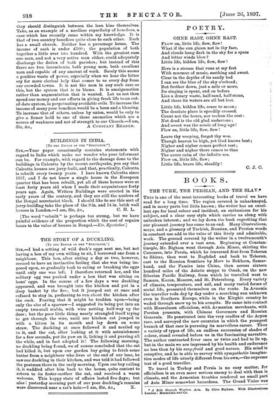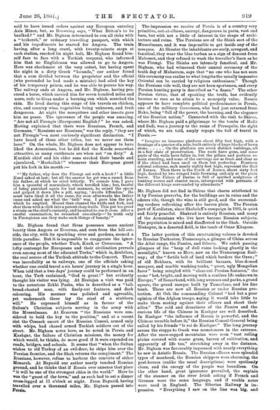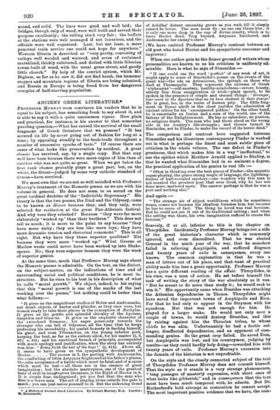BOOKS.
THE TURK, THE PERSIAN, AND THE SLAV.*
Tam is one of the most interesting books of travel we have read for a long time. The region covered is unhackneyed, and in many parts but little known ; the writer has an excel- lent eye for local colour and incident, an enthusiasm for his subject, and a clear easy style which carries us along with unbroken interest; and we lay down the book regretting that our pleasant journey has come to an end. Many illustrations, maps, and a glossary of Turkish, Russian, and Persian words in constant use add to the value of this lively and admirable, work. The ground covered by the writer in a twelvemonth's journey extended over a vast area. Beginning at Constan- tinople, Mr. Bigham went through Asia Minor, skirting the Caucasus, into Persia, which he traversed first from Teheran to Shiraz, then west to Baghdad and back to Teheran, east to the Russian frontiers by Mery to Bokhara, Samar- kand, and the Pamirs into China, then across sixteen hundred miles of the Asiatic steppe to Omsk, on the new Siberian Pacific Railway, from which he travelled west to Samara, Kazan, Moscow, and St. Petersburg. Every variety of climate, temperature, and soil, and many varied forms of social life, presented themselves on the route. In Armenia the traveller rode day by day under a scorching sun unknown even in Southern Europe, while in the Kirghiz country he waded through snow up to his armpits. He came into contact with Mussulman officialism, with Armenian merchants, with Persian peasants, with Chinese Governors and Russian Generals. He penetrated into the very cradles of the Aryan race, and surveyed the new countries in which the youngest branch of that race is pursuing its marvellous career. Thus a variety of types of life, an endless succession of shades of colour, stand revealed before us in the fascinating narrative. The author contracted fever once or twice and had to lie up, but in the main we are impressed by his health and endurance no less than by his sang-froid and good nature. His mind is receptive, and he is able to survey with sympathetic imagina- tion modes of life utterly different from his own,—the supreme test of a good traveller.
To travel in Turkey and Persia is no easy matter, for officialism is an even more serious enemy to deal with than is climate, and the Armenian troubles rendered no small part of Asia Minor somewhat hazardous. The Grand Vizier was
• A Ride through Western Ada. By Olive Bight.= With Illustration% London: Macmillan and Co.
said to have issued orders against any European entering Asia Minor, but, as Browning says, "What Briton's to be baulked P" and Mr. Bigham determined to run all risks with a " tezkereb," or ordinary travelling passport, with which and his impedimenta he started for Angora. The train
having, after a long crawl, with twenty-minute stops at each station, reached its night halt, Mr. Bigham found him- self face to face with a Turkish corporal, who informed him that no Englishman was allowed to go to Angora.
Here was checkmate at the very outset, but having spent the night in a dirty Greek " locanda," our author found that a sum divided between the proprietor and the official (who pretended he had made a mistake) had oiled the key of his temporary prison, and he was able to pursue his way.
The railway ends at Angora, and Mr. Bigham, having pro- cured a horse, which carried him for seven hundred miles and more, rode to Sivas under a burning sun which scorched the skin. He lived daring this stage of his travels on chicken, rice, and country wine, vegetables being unknown, and fruit dangerous. At night the mosquitoes and other insects gave him no peace. The ignorance of the people was amazing. "Are not all Firengis (Europeans) English P" he was asked.
Having explained that there were Russians, French, and Germans, " Russians are Russians," was the reply, "they are not Firengis "—a most curiously significant distinction. "I have heard of those other tribes, but we never see them here." On the whole, Mr. Bigham does not appear to have liked the Armenians, but he did find the Kurds somewhat attractive, as many cutthroats are when not "on duty." A Kurdish chief and his elder sons stroked their beards and ejaculated, "Mashallah!" whenever their European guest put his fork in his mouth
"‘ My father, why does the Firengi eat with a hook ? ' a little Kurd asked at last; but all the answer he got was a smack from his father, at which he cried bitterly. To console him. I gave him a spoonful of marmalade, which terrified him ; but, fearful of being punished again for bad manners, he seized the spoon and gulped it down like a pill, saying, 'Avolla Effendim.' He must have liked it all the same, for soon afterwards the father came and asked me what the tatli' was. I gave him the pot, which he emptied. Murad then cleaned the knife and fork, and shut them with a click into a patent clasp-knife. This put too great a strain on the chief's curiosity, and he asked to see it close. After a careful examination, he remarked oracularly—' In truth only in Firengistan can they make such things of beauty."
Mr. Bigham found that Sivas possesses more ancient beauty than Angora or Erzeram, and seen from the hill out-
side, the city, with its sparkling river and gardens, seemed a little paradise. But it is impossible to exaggerate the ignor- ance of the people, whether Turk, Kurd, or Circassian. "A lofty contempt for Europeans and their civilisation prevails even among most of the educated Turks," which is, doubtless, the real source of the Turkish attitude to the Concert. There was incredulity as to railways, one of the officials asking whether one could travel a six hours' journey in a single hour. When told that a two days' journey could be performed in an hour, the Turk exclaimed, "God is great !" but evidently thought his visitor was lying. At Ersinjan a visit was paid to the notorious Zekki Pasha, who is described as a "tall, broad-chested man, with finely-cut features, and dark colouring. His manner was polished and agreeable, yet underneath these lay the steel of a stubborn will." He expressed himself as in favour of the Sultan's Christian subjects serving in the army with the Mussulmans. At Erzerum "the Russians were con- sidered to hold the key to the position," and at a recent riot the Cossack escort of the Russian Consul, armed only with whips, had chased armed Turkish soldiers out of the street. Mr. Bight= notes here, as he noted in Persia and Kashgar, the failure of Christian missions, the money for which would, he thinks, do more good if it were expended on roads, bridges, and schools. It seems that "when the Sultan wishes to rid Turkey of an evil-doer, he ships him over the Persian frontier, and the Shah returns the compliment." The Russians, however, refuse to harbour the convicts of either Monarch. At Bayazid our author nearly touched Russian ground, and he thinks that if Russia ever annexes that place "it will be one of the strongest cities in the world." Here he was the "guest of the town," and as such had to eat a dinner cross-legged at 11 o'clock at night. From Bayazid, having travelled over a thousand miles, Mr. Bigham passed into Persia.
The impression we receive of Persia is of a country very primitive, out-at-elbows, corrupt, dangerous in parts, vast and bare, but with not a little of interest in the shape of archi- tecture and ruins. The Persians are of the Shiah sect of the Mussulmans, and it was impossible to get inside any of the mosques. At Shuster the inhabitants are surly, arrogant, and fanatical, they wear the blue turban as a sign of descent from
Mahomet, and they refused to wash the traveller's linen as he was Firengi. The Shiahs are intensely fanatical, and Mr.
Bigham, who had witnessed their annual ceremony of the tenth day of Muharrem, says that "no one who has not seen this ceremony can realise to what lengths the usually impassive Oriental can be carried by religious enthusiasm." Though the Persians ride well, they are not keen sportsmen, and every Persian hunting party is described as "a fiasco." The other Persian virtue, that of speaking the truth, has evidently become so rare as to attain to a monopoly value. Russia appears to have complete political predominance in Persia, one of the military Governors, who had just returned from Baku, being "full of the power, the learning, and the elegance of the Russian nation." Connected with the visit to Shiraz, where Mr. Bight= paid a pilgrimage to the tombs of Hafiz.
and Sadi, was a journey to the ruins of Persepolis, the sight of which, we are told, amply repays the toil of travel in, Persia
Imagine an immense platform about fifty feet high, with a frontage of a quarter of a mile, built entirely of huge blocks of hewn stone On the platform are seven distinct buildings, all in a fair state of preservation. The roofs have gone, and some
of the walls have fallen in, but the pillars and porticos re- main standing, and some of the carvings are as fresh and clear as if the chisel had been used on them but yesterday. Fourteen, colossal columns, each nearly eighty feet high, represent the Hall of Xerxes. Then there is the Porch of Xerxes, about sixty feet high, flanked by two winged bulls frowning sullenly at the plain below. The Palace of Darius is full of spirited sculptures of hunting scenes and chariot races, interspersed with portraits of the different kings surrounded by attendants."
Mr. Bigham did not find in Shiraz that charm attributed to it by Persian proverbs, for the buildings are in ruins and the odours vile, though the wine is still good, and the surround- ing verdure refreshing after the barren plain. The Persian part of Kurdistan, since Skobeleff's compaign in 1881, is quiet and fairly peaceful. Shahrad is entirely Russian, and many of the Armenians who live here become Russian subjects. The population is mixed and disaffected to the Shah. Outside Nishapur, in a deserted field, is the tomb of Omar Khayam.
The latter portion of this entertaining volume is devoted to Russian Turkestan, Transcaspia, a glimpse of China across the Altai range, the Pamirs, and Siberia. We catch passing glimpses of the "heap of dull rains looking ghastly in the moonlight," known as Merv, now on the Transcaspian Rail- way; of the "fertile belt of land which borders the Oxus ; " of old Bokhara, with its brilliant bazaars, blue-domed mosques, and marble washing-tanks, "queer, ugly Mongolian faces" being mingled with "clear-cat Persian features," the. scene "hot, bright, and moving with a restless life unknown in Europe;" of Samarkand, with long avenues and parks, a grand square, the grand mosque built by Tamerlane, and his fine tomb. These are now all Russian or under Russian pro- tection. At Osh the commanding Colonel "had but a poor opinion of the Afghan troops, saying it would take little to make them mutiny against their officers and shoot their allies." The cold and dreariness of the Pamirs and the curious life of the Chinese in Kashgar are well described-. In Kashgar "the influence of Russia is powerful, and the Chinese tremble before it," the Russian Consul-General being called by his friends "le roi de Kashgar." The long journey across the steppe to Omsk was monotonous in the extreme.. After the snow-capped mountains were seen "vast rolling
plains covered with coarse grass, barren of cultivation, and apparently of life too," stretching away in the distance. Mr. Bigham was favourably impressed with nearly everything he saw in Asiatic Russia. The Russian officers were splendid types of manhood, the Russian skippers were charming, the post-houses (unlike the usual descriptions) were spotlessly clean, and the energy of the people was boundless. On the other hand, great ignorance prevailed, the captain of the steamer on the river Irtish asking if French and German were the same language, and if rouble notes were used in England. The Siberian Railway bl im- pressive. "Everything I saw on the line wit!' big, and
sound, and solid. The lines were good and well laid; the bridges, though only of wood, were well built and served their purpose excellently; the rolling stock very fair ; the buffets at the stations were well managed if not luxurious, and the officials were well organised. Last, but not least, a more punctual train service one could not hope for anywhere." Western Siberia is described as "very pretty, consisting of valleys well wooded and watered, and acres of reclaimed marshland, thickly cultivated, and dotted with little Siberian towns built of wood, with the usual grass street, and gaudy little church." By help of the convict system, which Mr. Bigham, so far as he saw it, did not find harsh, the immense steppes and mountain regions of Siberia are being colonised, and Russia in Europe is being freed from her dangerous overplus of half-starving population.




















































 Previous page
Previous page